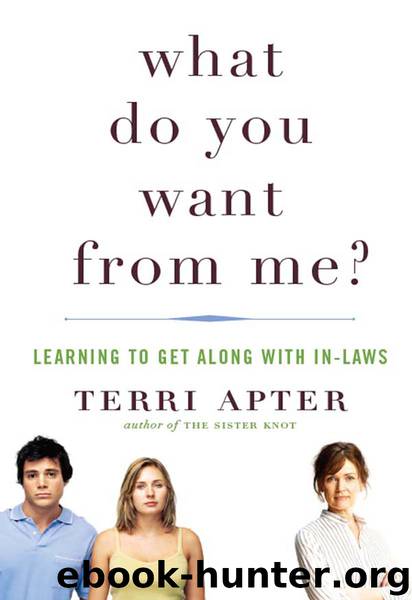What Do You Want from Me? by Terri Apter

Author:Terri Apter
Language: eng
Format: epub
Publisher: W. W. Norton & Company
Published: 2009-05-04T16:00:00+00:00
Handling Arguments
A great deal has been written about the clashes that arise from different styles of male and female conversations,6 but the significant language gap between women of different generations, with different priorities and different alliances, has, very surprisingly, been ignored. In-laws trip one another up with underlying messages or projected meanings that can turn an apparently superficial conversation into a minefield.
Not knowing how to have a friendly conversation is discouraging. Inadvertently behaving badly, just because you don’t know this family’s rules, is frustrating. But not knowing how to argue with someone is devastating. Here you are, poised for self-defense, burning from an insult, determined to slam your point home, and either everything comes crashing down around you or you find you have made no impact at all.
Finding your way through an argument is as important as knowing how to be friendly. In-laws, however, tend to operate on the assumption that direct arguments are dangerous. Ruth discovers the dangers of direct confrontation the hard way: “About a year after we were married, I did actually confront her. We had a fight, and at first I thought it helped. But, ever since, there’s been something else in her manner—a defiant coldness, like I proved just what a bad person I am. Now I feel even more of an outsider.” We saw earlier how Shelly’s attempt to defend herself with her mother-in-law leads her brother-in-law to confront her husband, and the quarrel spreads throughout the extended family. Yet some women find that their outbursts are ignored. Courage and determination can be useless if you don’t know the rules of engagement.
Each family has its own rules for arguing, and part of learning how to be a family is learning how to argue. If you don’t know how to argue, then direct engagement, with the consequent quick shifts in emotional temperature, is bewildering. Grace, for example, is confounded by the rhythm and rationale of her daughter-in-law’s temper. “I feel I should take heed of that ad for Jaws,” Grace tells me. “Just when you feel it’s safe to go back to the water…Well, my daughter-in-law erupts over an ‘issue,’ and is as ferocious as a shark. Then everything is OK again—until the next time. But I never understand what sets her off. The whole time I have to watch my step with her.”
The difficulty in navigating your way through an argument when you don’t know the family rules, the anxiety of interacting with a person whose responses you cannot predict, can make us “play safe.” This strategy results in a good-behavior syndrome that aims at avoiding conflict but ends up increasing discomfort.
Download
This site does not store any files on its server. We only index and link to content provided by other sites. Please contact the content providers to delete copyright contents if any and email us, we'll remove relevant links or contents immediately.
Should I Stay or Should I Go? by Ramani Durvasula(7669)
The Lost Art of Listening by Michael P. Nichols(7506)
The Rosie Project by Graeme Simsion(6416)
Beartown by Fredrik Backman(5756)
We Need to Talk by Celeste Headlee(5615)
Ego Is the Enemy by Ryan Holiday(5450)
Hunger by Roxane Gay(4928)
Suicide Notes by Michael Thomas Ford(4827)
I Love You But I Don't Trust You by Mira Kirshenbaum(3876)
Mummy Knew by Lisa James(3693)
Not a Diet Book by James Smith(3429)
Crazy Is My Superpower by A.J. Mendez Brooks(3401)
Toxic Parents by Susan Forward(3292)
Girl, Wash Your Face by Rachel Hollis(3282)
The Complete Idiot's Guide to Coping With Difficult People by Arlene Uhl(3149)
The Social Psychology of Inequality by Unknown(3031)
Name Book, The: Over 10,000 Names--Their Meanings, Origins, and Spiritual Significance by Astoria Dorothy(2987)
The Hard Questions by Susan Piver(2977)
The Gaslight Effect by Dr. Robin Stern(2794)
